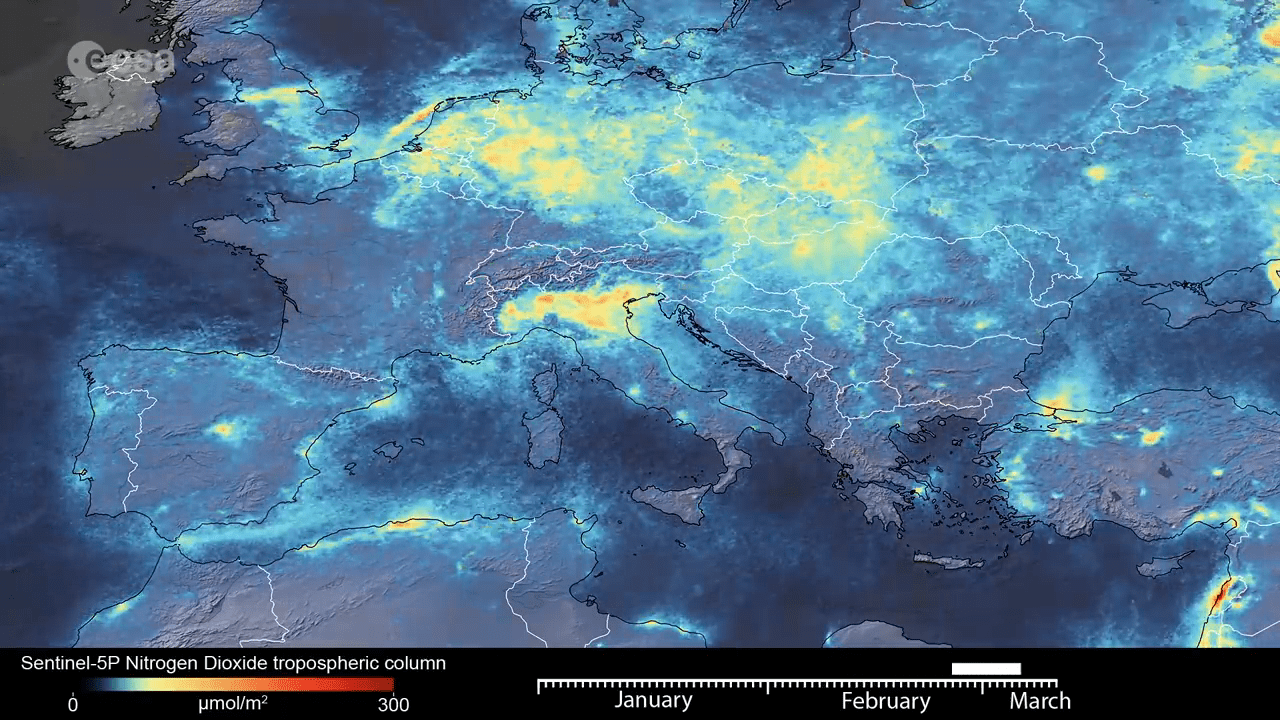By Patrick Metzger
Life is pretty strange for all of us right now. Hopefully, you’re practicing social distancing, remaining at home whenever possible until we hear otherwise. This has many of us feeling isolated in our own bubbles. And yet, at this moment our entire species is actually coming together all across the planet to rapidly adapt our way of life, and the environment is breathing a sigh of relief.
Pollution over China from nitrogen dioxide (NO2) emissions decreased sharply in February when compared to January, as satellite imagery from NASA’s Earth Observatory shows. As the country moved to contain the COVID-19 virus, industry slowed and pollution evaporated with it.

A similar reduction in NO2 emissions was observed in Italy by the European Space Agency when comparing March emissions with those in January. While reports of dolphins swimming in the canals of Venice have since been debunked (and swans regularly appear in the canals, not just recently), the improvement in air quality is noticeable and measurable.

This is an important reminder that when we slow down our culture, we come closer to being in equilibrium with our natural environment. We have been fed a myth of eternal growth and endless convenience, but that way of life is demonstrably unsustainable and simply will not last forever. We should take the lessons we’ve learned during this pandemic and apply them to our daily life. We must either slow ourselves down or the increased hazards of the climate crisis will forcibly slow us down over the coming decades.
While some of us have jobs that rely heavily on in-person attendance, many people and companies are now experiencing just how practical remote can be. Some are predicting that these cultural changes could create a permanent shift in more people working remotely. If this were the case, then we would expect to see decreases in emissions from commuting. Given that transportation accounts for 29% of greenhouse gas emissions in the U.S., this would be no small feat.
Research now suggests that humans’ disruption of habitats and biodiversity is worsening the spread of zoonotic diseases such as COVID-19. As habitats diminish and humans come more regularly into contact with wildlife, we increase the chances of virus transmission from animals to humans. If we can stop the decimation of the earth’s ecosystems, we just might decrease the frequency of global health pandemics while we’re at it.
It’s hard not to draw a parallel between the “virus denial” that some politicians expressed at the outset of the COVID-19 pandemic and the climate denial that scientists and activists have been struggling against for decades. In both cases, denial is leading to widespread mismanagement of the crisis, which only exacerbates the problem and leads to more dangerous outcomes. We need to trust scientists and use evidence-based methodologies to keep people informed with real information rather than misinformation.
COVID-19 is not the last pandemic our planet will face. The climate crisis and global health crises are entangled in ways we’re only now beginning to understand. We can change our way of life, and when we do, we protect ourselves and safeguard our future.
While we bunker down here for a bit, remember to support each other. We need to invest in people, not airlines. We need to come together as communities and support those in most need. We need to learn from this adapted way of life—that it is possible to change. It isn’t easy, and it isn’t convenient. But it’s what we need to do in order to survive the years ahead.
—
Resources for the isolated environmentalist:
- Keep the pressure on politicians virtually (email, social media, etc.) to enact drastic measures to combat the ongoing climate emergency. Check out FridaysForFuture.org for more ideas!
- Help others right now. People need support, and Idealist has some great suggestions for ways you can make a difference.
- Contribute to citizen science projects using Zooniverse.
- Learn how climate change and health are intertwined in Yale’s class on Coursera.
- In your down time:
- Learn about birds with Cornell Labs’ guide to virtual and at-home birdwatching.
- Learn about plant biology with Tel Aviv University’s class on Coursera.
- Watch Night on Earth (2020) on Netflix for stunning never-before-seen footage of nocturnal animals in their natural habitat.
- The Supreme Court is Wrong. Take Action. - July 2, 2022
- COVID-19 is a Wake-Up Call for Humanity - March 21, 2020
- Solar Panels on a Landfill: New York’s Newest Solar Farm Goes Live - July 2, 2018

